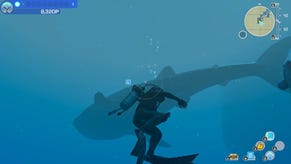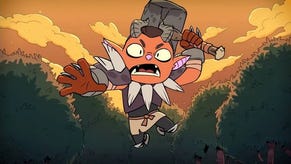Dust 514's new frontier
As CCP's trailblazing online shooter goes live, we visit a developer on the edge. But of what?
CCP has just flicked a very important switch. Today - shortly before this article was published - the Icelandic company's PlayStation 3 shooter Dust 514 entered open beta testing, which for a free-to-play game like this is as good as a soft launch. It's the moment the game's digital doors are thrown open to the public. Although CCP is 15 years old, this is only its second game launch. It's a big day.
The developer's head office is a modernist cube clinging to the edge of the wind-scoured fishing harbour of Iceland's capital Reykjavik, which clings to the edge of this sparse, bleakly beautiful volcanic island, which clings to the edge of the North Atlantic ocean and - it feels like - the civilised world. The top floor, with its lovely views of the city and the sea, was added after CCP ran out of space, and when the Arctic gale blasts in you can feel the whole loose structure flex.
Although it's nicely designed and furnished in the Nordic taste (raw materials, straight lines, fairy lights) it has a hint of the prefab about it - something it shares with many buildings in Iceland, where pretty painted cottages turn out to be made out of corrugated sheet metal. There's a vague sense of impermanence about everything here. It's as if, at any point, this 1000-year-old Norse settlement might simply call it a day, pack up and leave. Iceland is one of those places on Earth that still feels like a frontier, its inhabitants like frontiersmen. And that word describes CCP itself very well.
The story should be familiar by now. CCP's first and only other game is Eve Online, which will celebrate its 10th anniversary this year. An online game of space trading and combat, Eve was (and to a great extent remains) an unfathomably nerdy piece of work. But that's not what makes it such an outlier.
CCP decided that Eve would only ever have one server, that all players would occupy the same virtual universe or "shard". This was quite a feat for early-2000s network engineering, and expanding it to accommodate an ever-growing population of paying subscribers remains a challenge. The direct consequence of this brave move is a game like no other and a passionate community to match, with stories of espionage, embezzlement, realpolitik and high-stakes warfare that spill out of its ruthless space-capitalist sandbox and into the real world.
It was that monumental decision that cast CCP in the role of explorers and colonisers of the furthest reaches of video game space. With Dust 514, they've made another just like it, and established another frontier. Dust 514 inhabits the same single online universe as Eve, with players of each game on each platform able to influence each other's games and form alliances in the conquest of land and space.
A little under two weeks ago, on 10th January, Dust 514 was merged with Eve on the monolithic Tranquility server. Today, any PS3 owner with an internet connection can log in. Two separate games, one persistent universe: it's never been done before. It's a big day.
But does Dust 514, the game, live up to its own historic importance? And does it matter if it doesn't? I'm not convinced it does - on either count.
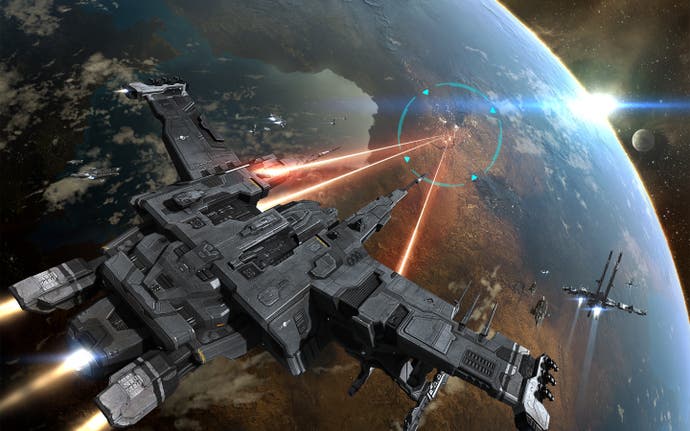
We've been invited to Reykjavik a few days ahead of the open beta. The excuse is an opportunity to see and try Dust 514's party trick: orbital bombardment, wherein a PS3 player in a Dust match can call in bombardment of enemy positions from a PC player piloting a ship far above the planet's surface in Eve. With the connection between the two games initially being limited so as not to destabilise Eve's economy (and while CCP works out a suitable rate of tax for currency transfers, among other things), this is currently the most immediate interface between Eve and Dust players.
Orbital bombardment has been demonstrated before, after a fashion, but now it's up and running in a live game over the internet - and as ever when you get to see the real thing after the hype, it's equal parts anticlimax and marvel. After accumulating sufficient points, a squad leader can call in the bombardment from a menu. The Eve player agrees, the Dust player targets the strike, the Eve player hits the button. On PS3, white-hot projectiles streak down from the sky with a sequence of bassy thuds. On PC, the starship pilot enjoys the more removed satisfaction of 10 player kills scrolling up his display in white text. That's it. It works first time. It doesn't work second or third time. Then it starts working again.
Look at either side in isolation and it's nothing exciting; the Dust player might as well be calling in an AI air-strike and the Eve player does little but click OK twice. It's up to your imagination - and perhaps, an appreciation of the technical achievement - to fill in the gaps. But that's the deal with Eve, which uses imagination and social gameplay to transform a dry experience into something electrifying as a matter of course.
Sad to say, Dust 514 is somewhat dry too, although in a different way to its sister game. Beneath a staggeringly deep layer of skills and equipment customisation lies a rather pedestrian mutiplayer first-person shooter. The visuals are anonymously grey, the art misses the hard futurist edge of Eve's aggressive ship designs, the weapons lack feel and the combat lacks finesse.
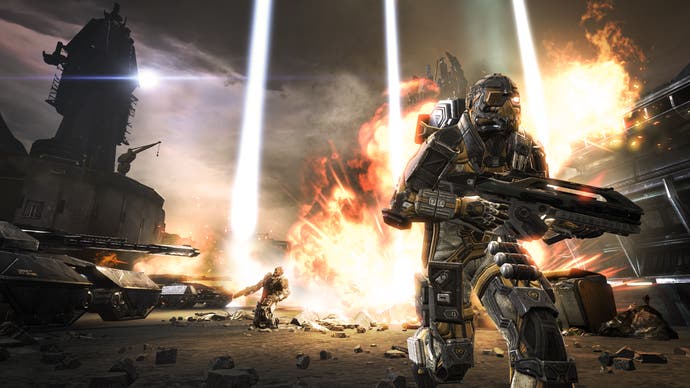
This game is tuned for long-term advancement through layers of increasingly expensive skills and equipment. It's not tuned for skill or momentary impact, and so it feels stodgy and undramatic. That said, the map we play - an industrial facility where you hack terminals to direct artillery at your opponents' flying Mobile Command Centre - is quite tightly designed and balanced, and the matches are close.
CCP's hope is that Dust 514's free-to-play nature is enough of a novelty on consoles to draw a casual shooter crowd. That might be true, but I doubt the game is sexy or responsive enough to keep them for long. What it does offer is extremely flexible and microscopically detailed specialisation and character development over the very long term, which might appeal to shooter fans who have acquired the arcane taste of role-playing. They'll also need the stomach for hours of shopping, fiddling and managing loadouts in the long menus of the stark front-end - and for the possibility of losing their gear, which in classic Eve style is lost when you die.
Kristoffer Touborg, a tall, relaxed Dane who's been at CCP for five years and serves as Eve's lead designer, admits that the complexity might be off-putting. But then, CCP didn't get where it is today by worrying about off-putting complexity. "I kind of like having the depth... for the really hardcore crowd, I don't know if they really have any other equivalent right now to go to as a shooter." He smiles. "Plus, you know, it kind of fits with Eve."
This is not Dust 514's secret weapon, though, any more than its business model or the orbital bombardment gimmick is - and it's certainly not the calibre of the gunplay either. The point, more or less, is this: Eve and Dust share a database. And the things recorded in that database are already of immense value to some 400,000 people. And those people are more motivated and socially organised that any other game community on the planet.
"The big Alliances have had their Dust corps ready for months... They're ready to go." - Kristoffer Touborg, lead designer of Eve Online
I ask Touborg if he thinks Eve players are buying into Dust 514. "Oh, yes. The big Alliances have had their Dust corps ready for months. Since Fanfest last year, essentially." Eve's big Reykjavik fan convention took place in March. "They're ready to go." Today, thousands of recruits, some of them Eve players, some of them not, will be loading up Dust 514 and hitting it hard - quite literally whether they like it or not. Their masters need those planets.
Eve has three levels of security. In high-security or "high-sec" space, Eve players fly solo, mine or engage AI craft in relative safety. In "low-sec" space there is organised combat with other players along lines imposed by the game in its Factional Warfare system. In "null-sec" or "0.0" space, it's anything goes, and the rewards for owning sectors of space go up with the risks.
Dust 514 will eventually move into what CCP considers the full sandbox of null-sec, with its much more elaborate territorial warfare. For now, Dust players can either engage in simple ranked matches in high-sec, or in low-sec Factional Warfare. There, their Corporations can ally with those in Eve to claim territory for the in-game factions. There will be significant benefits to Eve Alliances to own planets in the space they occupy, making it much easier to defend, and vice versa for Dust players.
At a stroke - and barring any absolute disasters - Dust is therefore guaranteed long-term engagement from a committed and motivated hardcore of players. That, in turn, guarantees a long-term commitment to the game from CCP.
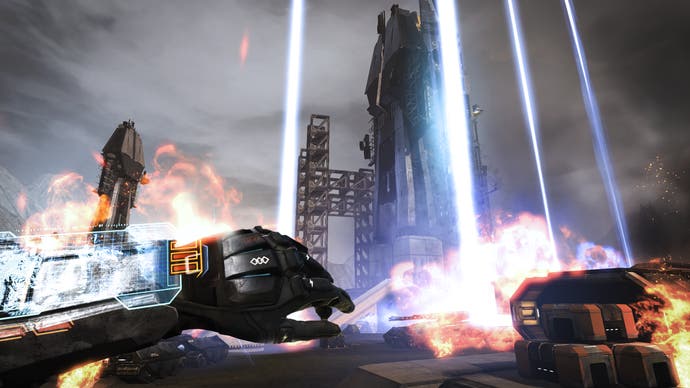
Not that such a thing is really necessary for a developer so comfortable with the idea of nurturing a game from basic beginnings over a number of years. Eve is one of extremely few subscription-based online games to consistently grow its audience over such a long time and it receives a major free expansion every six months, with almost clockwork regularity. "If there's one thing we can practically do in our sleep, it's churn out expansions," agrees Touborg. "That side of it we do pretty well; running a live product, we have immense experience with." More than any of their competitors on consoles, in fact.
If Dust 514 isn't great now - and even if it can never be a challenger to Halo or Battlefield in the future - that doesn't mean it won't turn into something special over time. One of the hardest things for a console audience to get their heads around is that, while CCP's developers may have a lot of ideas for how to develop Dust, they don't necessarily have a firm plan. They're going to see what happens.
"I don't think [Eve players] have a grasp of where Dust is going," says Touborg. "I don't think a lot of people here do either. This is something that needs to go out and you need to play around with it and kind of feel it. I think we have a hope of where it's going. I think we maybe understand it."
It sounds suicidally vague, but no other developer better understands how to design for open online worlds: when to interfere, when to step back and observe. This is a company, after all, that employs an economist and has an internal affairs team to keep its staff honest in its own game. It has also, in the last couple of years, had the experience of letting its ambitions get the better of it to the point that it almost poisoned its relationship with its fans.
"We shouldn't be afraid just because we screwed up. I think part of what makes CCP good is that we try these crazy things." - Kristoffer Touborg
Incarna, the June 2011 expansion for Eve, introduced player avatars and shipboard scenes for the first time - the first-step in a long-planned project to give Eve's drama a human face - and it had a pricey micro-transaction store to match. Players hated it, and combined with an unfortunate leak that described Eve's paying audience as a "golden goose", it caused an humbling crisis for the company and the first ever significant decline in Eve's subscriber numbers. Stung, CCP regrouped, shelved the Incarna project and knuckled down on Eve's core features. But it wasn't prepared to sacrifice Dust 514.
You'd think caution would have won out. You'd think there would be a nervous atmosphere in CCP's offices now, as the company prepares to launch another major project that isn't central to Eve but depends, to some extent, on the goodwill of its notoriously pugnacious players. But no, because CCP is a pioneer at heart, and a pioneer can no more afford to be timid than complacent or careless.
"We shouldn't be afraid just because we screwed up," says Touborg. "I think part of what makes CCP good is that we try these crazy things. Single-shard game worked great, tying two platforms together works technically so far; our Incarna thing didn't work out. But I think the great shame would be if we stopped trying new things." In fact, he confirms that other ideas for games that might share the Eve universe are floating around.
Some of them, perhaps, are in genres that are better suited to CCP's talents than a console FPS. No matter what they say, I can't quite believe that anyone at this company had a burning desire to make a kick-ass first-person shooter above all else. The problem with Dust 514 is that it feels like a game in service of an idea. But it is a hell of an idea, one that might just give this game a better chance of survival, a more compelling raison d'être, than many of its more accomplished rivals.
I ask Touborg if he thinks Dust 514 will change CCP. "Yes," he says, very definitely, arguing that it will give this one-game company the confidence to expand its repertoire. But perhaps the true effect will be that it makes CCP feel more like itself again; like the daring company that, 15 years ago, ignored the rules and set off in search of a new fronter. It's a big day.
This article is based on a press trip to CCP's office in Reykjavik. CCP paid for travel and accommodation.



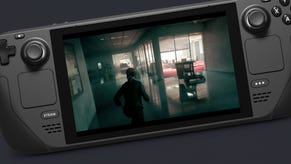
.jpg?width=291&height=164&fit=crop&quality=80&format=jpg&auto=webp)

_Rwmp6uD.jpg?width=291&height=164&fit=crop&quality=80&format=jpg&auto=webp)
